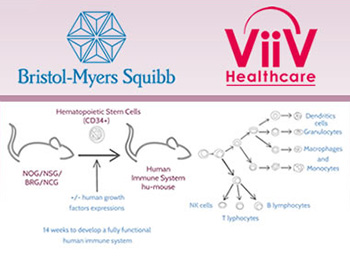BMS and Viiv are developing a Multi-specific inhibitor of HIV entry.
In this paper, they demonstrate that a long-acting antiretroviral could provide a useful alternative to daily oral therapy.
TransCure’s hu-mouse are the preferred in vivo models for HIV therapy evaluation.
A Combinectin (combination adnectin) as a long acting inhibitor of HIV-1
David Wensel, Yongnian Sun, Jonathan Davis, Zhufang Li, Sharon Zhang , Thomas McDonagh, David Langley, Tracy Mitchell, Sebastien Tabruyn, Patrick Nef, Mark Cockett
Abstract Long-acting antiretrovirals could provide a useful alternative to daily oral therapy for HIV-1 infected individuals. Building on a bi-specific molecule with adnectins targeting CD4 and gp41, a potential long-acting biologic, GSK3732394, was developed with three independent and synergistic modes of HIV entry inhibition that potentially could be self-administered as a long-acting subcutaneous injection. Starting with the bi-specific inhibitor, an alpha-helical peptide inhibitor was optimized as a linked molecule to the anti-gp41 adnectin, with each separate inhibitor exhibiting at least single digit nanomolar (or lower) potency and a broad spectrum. Combination of the two adnectins and peptide activities into a single molecule was shown to have synergistic advantages in potency, resistance barrier and in the ability to inhibit HIV-1 infections at low levels of CD4 receptor occupancy, showing that GSK3732394 can work in trans on a CD4+ T cell. Addition of a human serum albumin molecule prolongs the half-life in a human CD4 transgenic mouse, suggesting that it may have potential as a long acting agent. To show that, GSK3732394 was highly effective in a humanized mouse model of infection. GSK3732394 is currently in human studies. .

